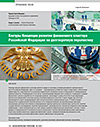Contours of the Concept of Developing Financial Cluster of the Russian Federation in the Long-Term Period
Availability of a strong financial cluster is one of the key conditions for further economic growth of the Russian Federation. The purpose of its creation is to form conditions for protecting investors and providing efficiency, transparency and development of the national stock market and enhancing its international attractiveness. In this article, the author, having analyzed the world experience in establishing a financial center and working out its development concept, recommends to create an Agency for Financial Cluster (Center) Regulation or an Investment Agency. In turn, it is recommended for the agency to establish an international council as a consultative and advisory body. In such a situation, priority of the state policy should become the improvement of system-forming factors that have a long-term impact on forming the practice of financial institutions activity: the quality of state regulation; the quality of corporate legislation; availability of reliable and high-quality information, as well as free access to it; the level of development of the financial sector infrastructure, the level of trust and awareness of the public about financial sector services (financial literacy realization); training of professional personnel for financial market; improvement of accounting and taxation of financial market participants and financial instruments.
References:
- Vorobey A.V. Kriptovalyuty v zarubezhnom prave i zakonodatel’stve Respubliki Belarus’ [Crypto Currency in Foreign Law and Legislation of the Republic of Belarus]. Promyshlenno-torgovoe pravo, 2016, no. 9.
- Doklad Stiglitsa o reforme mezhdunarodnoy valyutno-finansovoy sistemy: uroki global’nogo krizisa: Doklad Komissii finansovykh ekspertov OON [Stiglitz Report on the Reform of the International Monetary and Financial System: Lessons from the Global Crisis: Report of the UN Financial Experts Commission]. Moscow, Mezhdunarodnye otnosheniya, 2010.
- Lutsenko S.I. Ustoychivyy rost i investitsionnoe povedenie [Sustainable Growth and Investment Behavior]. Obshchestvo i ekonomika, 2015, no. 11–12.
- Lutsenko S.I. Otsenka i otbor dobrosovestnykh aktsionerov kompanii [Evaluation and Selection of Bona Fide Shareholders of the Company]. Ekonomicheskaya nauka sovremennoy Rossii, 2015, no. 2.
- Lutsenko S.I. Teoriya komandnogo proizvodstva v korporativnom upravlenii: pravo na zhizn’ [The Theory of the Team Production in Corporate Governance: the Right to Life]. Ekonomicheskie strategii, 2015, no. 1.
- Lutsenko S.I. Dilemma vybora modeli upravleniya kompaniey [Dilemma of Choosing a Company Management Model]. Pravo. Zhurnal Vysshey shkoly ekonomiki, 2014, no. 2.
- Shiller R. Irratsional’nyy optimizm: Kak bezrassudnoe povedenie upravlyaet rynkami [Irrational Optimism: How Reckless Behavior Drives Markets]. Moscow, Al’pina Pablisher, 2013.
- Yarosh A.S. Privlechenie investitsiy cherez ICO [Attracting Investments Through ICO]. SPS Konsul’tantPlyus.
- Federal’nyy zakon ot 10 iyulya 2002 g. № 86-FZ “O Tsentral’nom banke Rossiyskoy Federatsii (Banke Rossii)” [Federal Law No. 86-FZ of 10 July 2002 “On the Central Bank of the Russian Federation (Bank of Russia)”]. Konsul’tantPlyus, available at: http://www.consultant.ru/document/cons_doc_LAW_37570/
- Ukaz Prezidenta RF ot 31 dekabrya 2015 g. N 683 “O Strategii natsional’noy bezopasnosti Rossiyskoy Federatsii” [Decree of the President of the Russian Federation of December 31, 2015 No 683 “On the National Security Strategy of the Russian Federation”]. Konsul’tantPlyus, available at: http://www.consultant.ru/document/cons_doc_LAW_191669/
- Zakon Respubliki Belarus’ ot 22 iyulya 2003 g. N 226-Z “O valyutnom regulirovanii i valyutnom kontrole” [Law of the Republic of Belarus of 22 July 2003 No 226-Z “On Currency Regulation and Currency Control”]. Zakonodatel’stvo Respubliki Belarus’, available at: http://pravo.newsby.org/belarus/zakon1/z084.htm.
- Postanovlenie Pravitel’stva Respubliki Kazakhstan ot 30 maya 2015 g. N 393 “Ob utverzhdenii Plana sovmestnykh deystviy Pravitel’stva Respubliki Kazakhstan i Natsional’nogo banka Respubliki Kazakhstan po sozdaniyu i razvitiyu Mezhdunarodnogo finansovogo tsentra „Astana“ na dolgosrochnuyu perspektivu” [Resolution of the Government of the Republic of Kazakhstan dated May 30, 2015 No 393 “On Approval of the Plan of Joint Actions of the Government of Republic of Kazakhstan and the National Bank of Republic of Kazakhstan on Establishment and Development of the Astana International Financial Center for the Long-Term Period”]. Paragraf, available at: http://online.zakon.kz/Document/?doc_id=34016681.
- Postanovlenie Soveta ministrov Respubliki Belarus’, Natsional’nogo banka Respubliki Belarus’ ot 17 yanvarya 2013 g. N 31/1 “O plane sovmestnykh deystviy gosudarstvennykh organov i uchastnikov finansovogo rynka po povysheniyu finansovoy gramotnosti naseleniya Respubliki Belarus’ na 2013–2018 gody” [Resolution of the Council of Ministers of Republic of Belarus and the National Bank of Republic of Belarus Dated January 17, 2013 No 31/1 “On the Plan of Joint Actions of State Bodies and the Financial Market Participants to Increase Financial Literacy of the Population of Republic of Belarus for 2013-2018”]. Pravo, available at: http://www.levonevski.net/pravo/norm2013/num01/d01996.html
- Ukaz Prezidenta Respubliki Kazakhstan ot 29 dekabrya 2006 g. N 234 “O Kontseptsii po upravleniyu gosudarstvennym i valovym vneshnim dolgom” [Decree of the President of Republic of Kazakhstan Dated December 29, 2006 No 234 “On the Concept of Managing State and Gross External Debt”]. Paragraf, available at: http://online.zakon.kz/Document/?doc_id=30084651.
- Benartzi S., Thaler R. Save More Tomorrow: Using Behavioral Economics to Increase Employee Saving. Journal of Political Economy, 2004, vol. 112.
- Gilson R., Gordon J. Controlling Controlling Shareholders. University of Pennsylvania Law Review, 2003.
- Gordon J. The Rise of Independent Directors in the United States, 1950–2005: Of Shareholder Value and Stock Market Prices. Stanford Law Review, 2007, vol. 59.
- IRS Virtual Currency Guidance: Virtual Currency Is Treated as Property for U.S. Federal Tax Purposes; General Rules for Property Transactions Apply. The Internal Revenue Service.
- Rock E. Shareholder Eugenics in the Public Corporation. Cornell Law Review, 2012.
- Virtual Economies and Currencies: Additional IRS Guidance Could Reduce Tax Compliance Risks. U. S. Government Accountability Office



